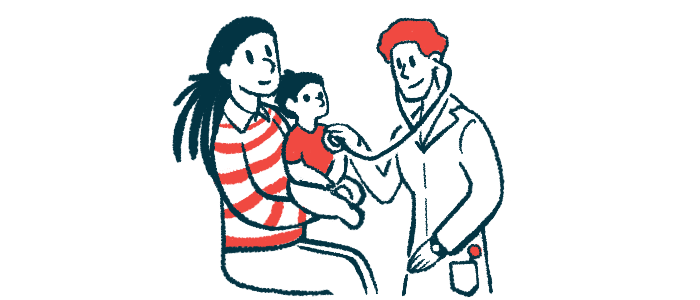Initial treatment with drug Soliris effective for severe aHUS in children
Short course of therapy led to remission for 4 patients with anti-FH antibodies
Written by |

Initial treatment with the drug Soliris (eculizumab) and immunosuppressive therapies was safe and effective for four children with severe atypical hemolytic uremic syndrome (aHUS) who had self-reactive antibodies against the complement factor H (FH).
That’s according to a study from Argentina, which reported that all of the children achieved remission, or a lack of disease activity, and eventually were able to discontinue Soliris without any aHUS recurrence. For three of the children, this happened after six months.
“Our data suggest that a short course of 6 months of [Soliris] might be sufficient to reverse … symptoms and improve kidney function in patients with severe FH antibody–mediated [aHUS],” the researchers wrote. “Timely initiation of C5 inhibitors [such as Soliris] is crucial and should not be delayed while awaiting laboratory test results.”
The study, “Eculizumab as first-line treatment for patients with severe presentation of complement factor H antibody-mediated hemolytic uremic syndrome,” was published in the journal Pediatric Nephrology.
Soliris shown to be an effective drug for aHUS patients with anti-FH antibodies
aHUS is a type of thrombotic microangiopathy, or TMA, a group of conditions characterized by red blood cell destruction, known as hemolytic anemia, low platelet counts, and blood clots in small vessels that can cause organ damage, particularly to the kidneys.
Genetic mutations that result in an overactivation of a part of the immune system called the complement cascade are known risk factors of aHUS, but cannot cause the disease on their own. As many as 50% of aHUS patients have self-reactive antibodies against FH, which prevents the complement cascade from being activated when it’s not needed.
First-line, or initial, therapy for aHUS patients with anti-FH antibodies usually involves plasmapheresis, a blood-cleaning procedure that helps remove self-reactive antibodies from the blood.
This is typically given alongside immunosuppressive therapies, such as corticosteroids, mycophenolate mofetil (MMF), and rituximab, which help reduce the production of self-reactive antibodies.
Soliris, a lab-made antibody that blocks the complement protein C5, is widely approved to treat aHUS. By preventing the cleavage of C5 into its activated forms, the therapy — administered intravenously, or directly into the bloodstream — can reduce complement activation.
An increasing number of case reports and small studies have reported favorable outcomes from using Soliris to treat children with aHUS linked to antibodies against FH.
All 4 children achieved remission after short course of Soliris treatment
Now, a team of researchers has described the cases of four children with FH antibody-mediated aHUS whose disease was effectively managed with the drug Soliris and immunosuppressants as first-line therapies.
Besides hallmark TMA signs, the three boys and one girl, ages 6 to 11, had gastrointestinal symptoms and severe kidney impairment at the onset of aHUS; three needed dialysis. Two children had neurological symptoms, such as seizures, disorientation, and speech problems.
Mutations in complement genes were detected in all three boys, but not in the girl.
All of the children received Soliris as a first-line therapy an average of 16 days after disease onset, and before the positive results for anti-FH antibodies were available.
After the presence of the self-reactive antibodies was confirmed, the children received oral prednisone, a corticosteroid, for 30 days, followed by a gradual withdrawal. They also received MMF as a maintenance therapy for a minimum of two years to reduce the risk of relapses.
After beginning Soliris, the children showed rapid reductions in blood levels of anti-FH antibodies, a marker of kidney disease called creatinine, and a marker of red blood cell destruction called LDH. At the same time, their platelet levels quickly increased.
[These findings provide evidence] about the effectiveness of a short course of [Soliris] as the first line of treatment in this group of severely affected patients.
It took five to 15 days for platelet counts and LDH levels to normalize, while creatinine normalization took 28 to 88 days, or about one to three months. Neurological symptoms were also resolved in all cases.
All four children showed a significant drop in their anti-FH antibody levels after six months of Soliris treatment, and the drug was discontinued in three of them. The remaining child required a longer treatment duration and the addition of rituximab due to persistently high anti-FH antibody levels. In this case, Soliris was discontinued after a little more than a year, even though the level of anti-FH antibodies was still above normal.
None of the children experienced a relapse during the follow-up period, which ranged from eight months to about two years. At their last visit, all had normal kidney function tests.
These findings provide further evidence “about the effectiveness of a short course of [Soliris] as the first line of treatment in this group of severely affected patients,” the team wrote.
The data emphasize that timely initiation of Soliris, combined with immunosuppression, is effective in reversing TMA symptoms, improving kidney function, and lowering FH antibody levels in patients with severe aHUS.
In addition, “early administration of [Soliris] avoided the requirement for [plasmapheresis] in this series of patients,” the researchers wrote.
This and other studies suggest that Soliris might be useful for managing severe cases of aHUS without relying on prolonged therapy or more invasive procedures like plasmapheresis, according to the researchers. Still, benefits and limitations must be considered for each treatment and patient, the team noted.
More studies are needed to determine the best duration of Soliris treatment and the role of additional immunosuppressive medication.







